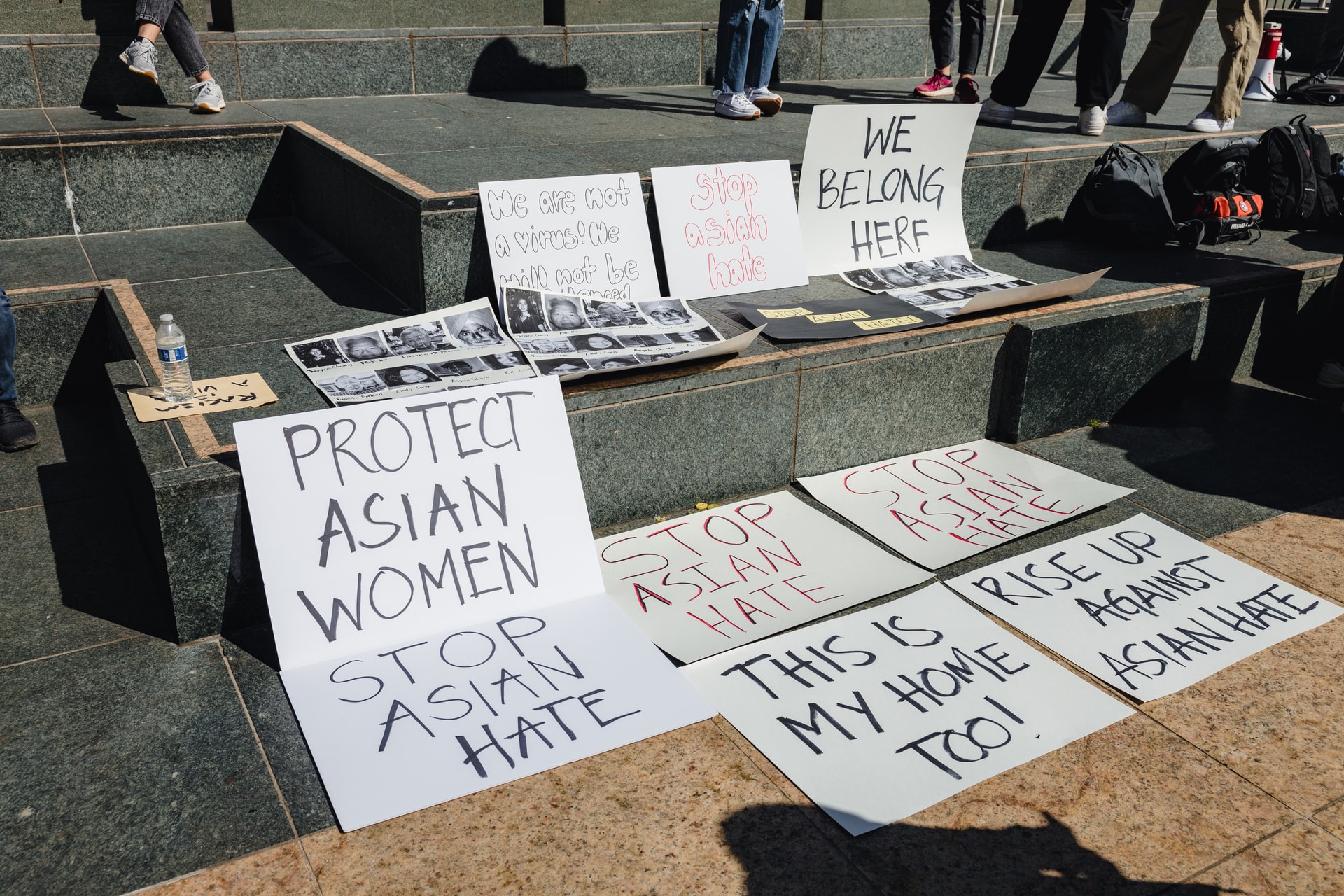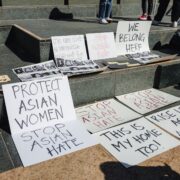
Trigger warning: this story references real-life experiences with self-harm.
THE recent incidents involving violence and harassment targeting Asian Americans have left the entire community on high alert.
The Asian American community has experienced intensified discrimination, bullying, verbal harassment and physical harm over the past year. However, in the last few weeks, brutal violence and, in many cases, death, have made the threats to the community feel more real, as previously reported in the Asian Journal.
In recent days, in Southern California, there were two separate reported incidents of assailants throwing stones at Asian Americans — one on Wednesday, March 31 toward a Korean American family in Fullerton and one on Saturday, April 3 toward Filipino American customers at the popular restaurant Dollar Hits in the Historic Filipinotown neighborhood of Los Angeles, as previously reported by the Asian Journal.
Over the weekend on Saturday, April 3, a Chinese American woman named Ke Chieh Meng was stabbed and killed in Riverside while she was walking her dogs in what officials are calling a “random” attack. (Riverside Police, however, don’t suspect the killing was motivated by race.)
As these attacks continue to proliferate across the country at disturbing rates, political leaders, like President Joe Biden, have denounced the attacks and committed to enacting legislative solutions to combat these attacks.
But the damage cannot be undone, and though lawmakers and community leaders scramble to mitigate anti-Asian hate and violence, the mental and emotional toll of these attacks is unquantifiable.
“Asians were not only fighting the pandemic but we were fighting racism,” Dr. Carolee Tran, clinical psychologist and instructor at UC Davis, told reporters during a recent press briefing.
“It’s tragic and unacceptable that it took the events of Atlanta to really get the attention of the general public,” Tran said. “When we have these incidents, we watch them on TV, we watch on the news, we feel all these things in our body.”
For decades, the Asian American community has simultaneously grappled with the model minority myth — which posits that intense assimilation with the white majority will make them more acceptable and lead to more upward mobility — and the notion of being the “perpetual foreigner.”
In the Asian American community, talking about things like race and mental health aren’t commonplace — in fact, it’s often discouraged. According to Mental Health America, Asian Americans are less likely to seek mental health services than any other racial group in America.
“Awareness of racism and living in a scary atmosphere causes one to be hypervigilant. It affects our prefrontal cortex, the amygdala,” Tran said. “These are the areas of the brain that impact affect and emotions. It can affect people’s concentration, attention, a sense of motivation even. You can feel more fatigue.”
Gilynn Chavez, a 24-year-old Filipina American student at Cal State Long Beach, shared that the recent attacks on Asians have dramatically affected her concentration.
“I can’t even look at the videos without shutting down for the rest of the day,” Chavez told the Asian Journal in a Zoom interview on Thursday, April 1, referencing the extremely graphic video of the Filipina who was attacked in New York City at the end of March.
“The attack itself was hard to look at, but it was made even worse when you see the security guard in the video close the door and not do anything. Who does that? It’s so inhumane,” she said.
Chavez, who was born in California, shared that seeing these videos and reading on these incidents has increased her anxiety. She’s skipped classes and called in sick to work, and she admitted that seeking professional help has not been a priority for her.
“I think the worst are the explicit xenophobic remarks, like when these racists actually tell people to go back to their country,” Chavez said. “It shouldn’t matter, but so many of us [AAPIs] are from here or grew up here; we’re just as American as anyone else. And that really triggers my anger and mood, and I think that [is true] for so many Asians.”
Jen (who asked that her last name be withheld) is a first-generation Filipina American living in Arcadia, California and who is now in the process of familiarizing herself with her own mental health — and the collective mental health of the Asian American community — in the wake of these attacks.
“For a long time I think many of us [in the Asian community] have felt that our issues don’t matter to the general public, so it’s been illuminating over the past few weeks that our stories are actually making it to [the mainstream],” Jen shared with the Asian Journal on Friday, April 2.
Jen, 36, was born in the Philippines but has lived in California since she was 6 years old.
The single mother of two daughters, ages 10 and 6, shared that they have experienced microaggressions in their Orange County neighborhood since the beginning of the pandemic.
“As Filipinos, like most other Asian cultures, [we] aren’t really encouraged to talk about mental health, and I think that becomes more extreme when you’re living in America. There’s this intense pressure to save face,” Jen shared. “And that’s valid, or at the very least, I understand that. But now we’ve got all these unpacked issues that we’re all trying to navigate.”
Jen shared that learning of these attacks and seeing incidents appear in the news every day has “diminished” her overall well-being. Like many other Asian Americans, she feels “unsafe” and fears for the safety of her family. But she also feels emboldened to engage in more conversations to help destigmatize mental health within the Asian American community.
“I have a lot of non-Asian friends who have been graciously checking on me, and to be honest, I’m not doing all right. My daughters are starting to take notice, too. I’m afraid to talk to them about these things because they’re so young. But I think it’s an important conversation to have, especially with young people,” Jen added, saying that she wishes that she grew up feeling open to talking about mental and emotional health.
A Filipino and Chinese American who lives in Orange County named David (not his real name) shared with the Asian Journal that the recent attacks have taken a severe toll on his mental health, so much so that “self harm ideations” have sprung up for him.
“I haven’t done anything like that but I’ve thought about it, and that’s scary because I haven’t had a self-harm thought in years,” David shared in a Zoom interview on Monday, March 29.
David said that the incidents that took place in Orange County have leveled up his anxiety and his concern that his parents or someone else he knows could be the next victim. Like Chavez, David admitted to not feeling motivated to seek professional mental health.
“What people don’t talk about when it comes to therapy or seeing a psychologist or doing anything resembling seeking professional help is how difficult it is to do yourself when you’re currently suffering,” he said. “You can’t just Google ‘therapy’ and immediately make an appointment and have that appointment change your life. All of this takes so much time and energy — time and energy I’m already stretching to do daily tasks.”
Liane Velasco, a Filipino American licensed marriage and family therapist (LMFT), told the Asian Journal in a phone call that “what lots of people who don’t suffer from major depression don’t understand about things like self-harm or withholding daily tasks is that it is a coping skill. It’s not healthy, but it is a way to cope.”
“What helps in stopping the behavior is replacing it with something else. For example, if you are cutting yourself in order to cope, you can replace that with something more gentle, like having a hair tie or rubber band around your wrist and lightly stretching it and letting go,” she said. “When we self-harm, it’s usually to try to feel something, but if we can wean ourselves off slowly, it can help us in the long run and stop those behaviors entirely.”
Velasco recommends that people who may not know where to start when it comes to seeking therapy or psychiatric services to consult with their primary care physician or with their health care group. Virtual therapy options, like BetterHelp that offers sessions only online, have also been a popular therapy option during the pandemic.
Additionally, the Asian Mental Health Collective has a directory of Asian, Pacific Islander, and South Asian American (APISAA) therapists and mental health professionals in all 50 states.
If you or someone you know someone is struggling with suicidal ideations, the National Suicide Prevention Hotline — 800-273-8255 — is available 24 hours a day. For emergencies, always dial 9-1-1.







